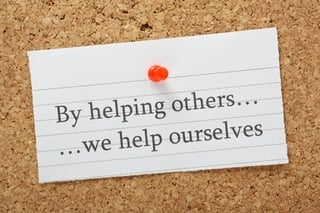
- admin
- January 23, 2017
- 8:22 am
5 Habits That Increase Business Networking Success
Are you in business, either as a founder or employee? If the answer is yes then you are already involved in networking, whether you realize it or not.
Take a moment to consider that every time you engage with someone, you are networking. You could be connecting in person, on the phone, through an email, a chat room, or on social media. Regardless of where you choose to connect with others, you are engaging in the subtle art of networking.
Networking Should Be Subtle
Some of you won’t necessarily agree with that header, but this author takes the hard stance that networking should never be a pushy, in-your-face attempt to win the attention of others. Maybe that’s because I gravitate toward a more empathetic, listening-oriented approach to networking. I like to leverage what many refer to as the 80/20 Rule. Others call it a Power Hack.
“Visualize what the 80/20 split might look like at your next networking event. If you spend five minutes talking to someone, you’ll want to limit talking about yourself to one minute—and cede the floor to your new connection for the rest of the time.”
Emma Miller, Writer for LearnVest
The practice of networking is not about attending every possible community function, industry conference, or after hours event that you stumble across. Rather, effective networking is about making valuable connections with people everywhere you go. The best real estate agents know this. Networking is what their businesses and personal brands are built on.
Networking is a process. Just like any process, it must be developed and cultivated in order for you to find success. Below, you’ll find five critical habits that will help build your networking skills, and get you closer to the prosperity you crave.
Network the Right Way
Above, I mentioned that networking should be subtle rather than obvious. To illustrate what I mean by subtle, consider the kind of networking that takes place at informal social gatherings. We make small talk and happen upon similarities in an organic way (“You’re on that fantasy football league with my friend, Josh! Oh, man. I’ve known him since second grade. Small world! We should all grab drinks sometime.”).
Instead of forcing in-depth conversation, we find opportunities to make lasting connections. At the very least, we find reasons to connect with certain individuals after the gathering is over, which is the fundamental goal of successful networking: to find relevant, memorable reasons to connect with someone after the specific event has past.
“Most people do not listen with the intent to understand; they listen with the intent to reply.”
Stephen R. Covey, Co-Founder of FranklinCovey
Lest you misunderstand me, I’m not telling you to be unintentional with your networking. I’m not advocating for a lazy, half-assed approach. There is no cross-your-fingers-and-hope advice going on here.
What I am saying is that successful networking will never take place if your strategy is to walk straight up to people and talk their ear off hoping to gain customers, clients, strategic business partners, followers, and the like simply because you’re chatty. Don’t be that talkaholic. Your time will never translate into more money. Instead, you will be pigeonholed as “that” guy or gal. And no one wants to be caught dead talking to “that” obnoxious individual who clearly lacks social etiquette and listening skills.
“The truth is, most of us are hearing to respond, when we should be listening to understand.”
Sean Kim, Founder of The Growth List
So how do you go about creating a networking process and incorporate it into your life?
5 Habits That Increase Business Networking Success
1. Volunteer
Volunteering is a great way to meet others while giving back to your community in a significant way. There are plenty of churches, soup kitchens, shelters for women and children affected by domestic violence, clothing closets, and animal shelters that need extra hands and open hearts like yours. Aside from the obvious choices, there are many other ways to give your skills and time to volunteering.
If you have children, find time to volunteer at school functions like the annual auction, field day, or craft nights. School fundraisers are particularly awesome opportunities, because they take months and months to prepare. Meetings are typically hosted at a school family’s house after work hours, providing a more intimate setting to socialize with new and known connections. You’ll grow your professional network, and probably make a few friends for life.
 Depending on your interests, volunteering for a nonprofit could be your cup of tea. There is likely a nonprofit for every cause under the sun, so chances are you can find a nearby nonprofit that aligns with your values. It’s also worth mentioning that nonprofit boards and committees are often made up of wealthy, successful people. If you stick around and put your best foot forward, chances are you will gain referral business from fellow board and committee members, donors, vendors, and others within the organization. So you can have your cake (give) and eat it, too (get).
Depending on your interests, volunteering for a nonprofit could be your cup of tea. There is likely a nonprofit for every cause under the sun, so chances are you can find a nearby nonprofit that aligns with your values. It’s also worth mentioning that nonprofit boards and committees are often made up of wealthy, successful people. If you stick around and put your best foot forward, chances are you will gain referral business from fellow board and committee members, donors, vendors, and others within the organization. So you can have your cake (give) and eat it, too (get).
Speaking of boards and committees, for profit businesses are just as likely to be made up of wealthy, successful people. Don’t think you’re qualified to be on a board or committee? No problem! Set your sights on that goal then go after it. Start small by being a general volunteer, if possible. Greet people at events, donate your web design or marketing skills, sort paperwork, host a discussion, and so on. All of these opportunities will set you up for the possibility of becoming a board member, so stick with it! You’ll meet wonderful people in the process, and add them to your network in an authentic, natural way.
Mentoring is another fantastic way to meet people. Currently, I am both a mentor and a mentee with a local nonprofit group called PDX WIT, which stands for Portland Women in Tech. Their mission is insanely compelling for us women (and men) looking for gender equality in tech, and their events are always rich in thought leadership and community building. Their networking is phenomenal, too. In fact, the group is now the largest, most active group in all of Portland!
I started attending PDX WIT events about two years ago, and have only ramped up my involvement since then because I just couldn’t stay away. And now I have a mentor who is at the top of her game as a female founder in tech. Let’s just say she does a great job of showing me the ropes and introducing me to all the right people. I’m also learning a ton from my mentee who is a brilliant young man doing incredible things in software. Yes, I lead him toward a more professionally lucrative life. But he also introduces me to the brilliant, successful people in his circles, and shares different ways of thinking that I wouldn’t have found if I’d just stayed home and watched Netflix.
Not every volunteer opportunity will yield co-volunteers who can help build your network, but most will. Look for the opportunities that call to you. Give back to your community, and you’ll undoubtedly build valuable relationships in the process.
2. Create Wins for Others
Give more than you get is the growth mindset here.
For many of us working in highly competitive environments, putting others ahead of ourselves isn’t always at the top of our list. Admittedly, it’s often more toward the bottom. We’d rather “one-up” someone than help them get a promotion or move their business forward a notch. Why? Some say we’re hardwired to compete. Others say it’s conditioning that begins at an early age.
 Regardless of what side of the nature-nurture conversation you choose to side with, the point I’m making is that competition is part of the way things are. But it doesn’t have to be. In fact, if you want to succeed at business networking then your urge to compete with everyone will need some reworking.
Regardless of what side of the nature-nurture conversation you choose to side with, the point I’m making is that competition is part of the way things are. But it doesn’t have to be. In fact, if you want to succeed at business networking then your urge to compete with everyone will need some reworking.
Before you throw your hands up in defeat and stop reading this article, take a breath and consider this quote by Tony Jeary, an established author, executive coach, and presentation strategist who has published more than three dozen books about strategic effectiveness and making presentations. He coaches the world’s top executives from companies such as Wal-Mart, Ford, New York Life, and Texaco, so he knows his stuff.
“To be the best, have the best and deliver the best results, you must be completely comfortable and confident that you will win when you help others win. If you want to see amazing results, embed this philosophy in your life and your organization.”
Tony Jeary, for Success Magazine
Do you remember earlier when I wrote about going to a party and meeting someone who happens to be in a childhood friend’s fantasy football league? I use that same story now to illustrate the importance of intention.
When you intend to connect people, you will say things like “Small world! We should all grab drinks sometime.”
Do you know what that does for your business?
A future opportunity is created. Another opportunity to listen up and pay attention to who is in front of you. Don’t keep score. Just connect, and look for ways to help the person you are speaking with. Notice I wrote “with” not to, because it’s always best to dialogue with rather than talk to (aka “at”) someone. You will inadvertently come across points of interest in your conversations that can lead to business growth if you put intention on building your network ahead of talking about what you’re doing, what you need, and trying to be heard.
“When’s the last time someone deliberately went out of his or her way to introduce you to someone after listening to your struggles? If you’re the rare breed that has experienced this, you’ve met a superconnector.”
Anonymous Staff Writer, Fortune Magazine
3. Be Strategic
Networking is about who you know. Not in a Mean Girls kind of way. This isn’t a popularity contest. It’s more a matter of connecting with, and nurturing, relationships with people who are aligned with your goals.
 The more you get out there, socialize, volunteer, and remain intentional about creating additional opportunities to connect with people you’ve already met, the closer you’ll get to building a community of influence and stature around you.
The more you get out there, socialize, volunteer, and remain intentional about creating additional opportunities to connect with people you’ve already met, the closer you’ll get to building a community of influence and stature around you.
You can expand your options for networking in a variety of way, depending on your goals. If you’re looking for groups and face-to-face events near you, search for them on meetup.com and Facebook. Stay connected to local and national groups on social media by joining groups. Offer helpful comments or ask questions on Reddit, Quora, and the like. Show up in feeds, forums, and threads. Get upvoted. Build authority. Gain traction and favor in your industry and with your ideal buyer through personalized communication.
Want more suggestions?
Look into attending a few meetings at local civic groups like the Chambers of Commerce. Go to organized, early morning breakfast chats. Enjoy the company of others at a luncheon where the speaker discusses a hot topic in your industry. Grab dinner with someone simply because you both love soccer…and you have a sneaking suspicion that your complementary expertise will move both of you closer to your unique goals.
Broadcast your conversations. This can be in the form of eBooks, webinars, masterclasses, or how-to videos. Podcasts are my personal favorite lately.
Of course, you can also record an interview on the minicomputer you keep glued to your hand, and later embed snippets of the recording onto your website and/or in an article.
For the more socially robust among us, speaking engagements are the absolute way to go. If you can land them, they are immensely valuable.
4. Think Positive
How does positivity lead to success? More importantly, how does it lead to business networking success?
 For starters, positivity opens us up to new ideas and better solutions, which helps us be more creative and make better decisions. Positivity supports collaboration, since working with happy people is simply more conducive to the exchange of information. Studies show that people with a positive attitude have more energy, more self-confidence, set higher goals, and are more effective at reaching their goals consistently due to their resilience.
For starters, positivity opens us up to new ideas and better solutions, which helps us be more creative and make better decisions. Positivity supports collaboration, since working with happy people is simply more conducive to the exchange of information. Studies show that people with a positive attitude have more energy, more self-confidence, set higher goals, and are more effective at reaching their goals consistently due to their resilience.
“Pessimism is trouble because it’s bad for your health. Numerous studies have shown that optimists are physically and psychologically healthier than pessimists.”
Travis Bradberry, co-founder of TalentSmart
How does positivity work?
When we think positively, we engage our parasympathetic nervous system. Don’t remember this term from your middle school science class? Not to worry. The parasympathetic function of the nervous system is responsible for relaxation, and for slowing down our heart rate. When we tap into our calm, we experience a sense of renewed optimism that allows us to perform better at work and get along with our colleagues.
“A positive and forward-looking mindset is a muscle that needs to be exercised every day. One way I do this is by exposing myself to the thoughts and ideas of successful entrepreneurs through articles, books, and podcasts. This inspires me to stay focused on the bigger picture and the positive aspects of my business as well as help me avoid the pitfall of negative self-talk.”
Dr. Joel Carney, contributor for CareerHMO
In his article “The Millionaire Mindset: 53 Habits That Foster Wealth and Success,” J. D. Roth explores the habits and beliefs of the wealthy that differ from those of the poor and the middle-class. Here are the ones that highlight a positive attitude:
- Rich people believe: “I create my life.” Poor people believe: “Life happens to me.”
- Rich people focus on opportunities. Poor people focus on obstacles.
- Rich people associate with positive, successful people. Poor people associate with negative or unsuccessful people.
- Rich people act in spite of fear. Poor people let fear stop them.
- Rich people constantly learn and grow. Poor people think they already know.
To be clear, we are talking about success as it relates to lead generation, revenue growth, and sustainable business. That kind of success is open to anyone determined enough to get there. It’s a process, to be sure. But the verdict is conclusively clear: Happy people are professionally and financially more successful.
5. Develop and Nurture Real Connections
How many revenue generating opportunities do you miss by not following up?
The first rule of networking is: Don’t just exchange business cards. Because we all know what really happens to business cards…
 The best networking comes from developing authentic relationships with those you meet. Once you truly understand this, you’ll look at networking as an opportunity to make friends rather than gain contacts. You’ll want to grow your network instead of build your list. See the difference? It’s subtle but powerful.
The best networking comes from developing authentic relationships with those you meet. Once you truly understand this, you’ll look at networking as an opportunity to make friends rather than gain contacts. You’ll want to grow your network instead of build your list. See the difference? It’s subtle but powerful.
When we think about networking in this light, we can begin to exercise our “give more than you get” growth mindset as discussed above. This opens up enormous possibilities for growth.
For instance, consider the inherent follow-up opportunities provided by special occasions like a birth, death, birthday, wedding, graduation, anniversary, award, job promotion, article publication, and social media mention. If you’d reach out to your best friend, sibling, or colleague with a brief message, there’s no reason why you shouldn’t also reach out to your networking friend.
Yet, while that kind of follow-up is a fantastic opportunity to stay connected over time, you should be touching base with your networking friends well before they have a special occasion in their lives. To begin with, send them a quick email right after you meet them, highlighting something you both enjoyed talking about.
Don’t ask for anything (e.g., follow me on FB, LI, Instagram, blah blah blah). Simply state your gratitude.
Above all else, value the quality of your networking friendships over the quantity.
Happy networking!
Categorized
Posts you might also like...

6 Leadership Quotes on Delegation to Inspire You to Greatness
February 5, 2023

How a Delegative Leadership Style Improves Team Success
February 5, 2023

How to Use MOCHA to Delegate Effectively
February 5, 2023

